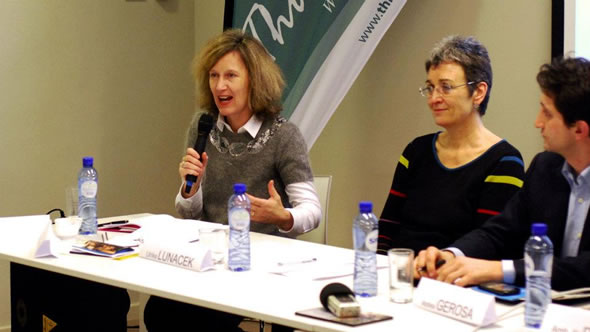Brussels – ESI advocates visa-free travel for young Kosovars

ESI Senior Analyst Alexandra Stiglmayer spoke out in favour of a strict, but fair visa liberalisation process for Kosovo at the conference "Advocacy for Young People in Kosovo – Sustainable Development in Kosovo". The conference was organised by the think-tank "ThinkYoung" in Brussels on 5 March 2012. ThinkYoung targets young Europeans and has endeavoured to raise awareness in the EU of the problems of young Kosovars.
Alexandra welcomed the launch of a visa dialogue between the European Commission and Kosovo on 19 January 2012, stating that it was important that the visa liberalisation roadmap be handed over as soon as possible. This roadmap will list all the requirements that Kosovo needs to meet in order for the Schengen short-term visa requirement to be lifted. She said that Kosovo is embarking on this process four years after its neighbours in the region and that it is of utmost importance that the process be as "strict but fair", merit-based and depoliticised, as it was for the other Western Balkan countries. In that case, the process can trigger important reforms that will enhance the security of the EU as well as that of Kosovo, she said.
Alexandra discussed the obstacles that Kosovo has faced so far, ranging from the lack of recognition of its independence by five EU member states, to fears of migration from Kosovo to the EU by several EU countries and pointed to two reports that ESI published on the issue of visa-free travel for Kosovars in 2009 and 2010. ESI's reports show that the status issue is no legal obstacle for visa-free travel and that migration concerns can be tackled.
Alexandra also mentioned that recently there were other good news for Kosovo: In February, Serbia and Kosovo agreed in the framework of the Pristina-Belgrade Dialogue on how to call Kosovo in regional fora, which should lead to Kosovo's participation in regional meetings. Shortly thereafter, EU member states agreed to launch a feasibility study to examine whether Kosovo meets the political, legal and economic criteria for a Stabilisation and Association Agreement with the EU. Alexandra warned that Kosovo might not be able to conclude such an agreement with the EU given that it has not been recognised by all EU member states, but said that the Feasibility Study would still be a useful exercise to identify strengths and weaknesses. She also said that the limits to what the EU can offer to Kosovo make it important that things that it can offer, such as the visa liberalisation process, are actually done. Finally, she stressed that Kosovo and Serbia must recognise that life will be easier for them if they both walk towards the EU.
Other speakers at the conference included Kosovo's Ambassador to Brussels Ilir Dugolli, MEP and Kosovo rapporteur Ulrike Lunacek, and MEP Doris Pack.
A report by ThinkYoung about the conference can be found here. Please also visit ESI's Kosovo country page and our website about the visa liberalisation process in Kosovo: Kosovo, the Balkan Ghetto.
